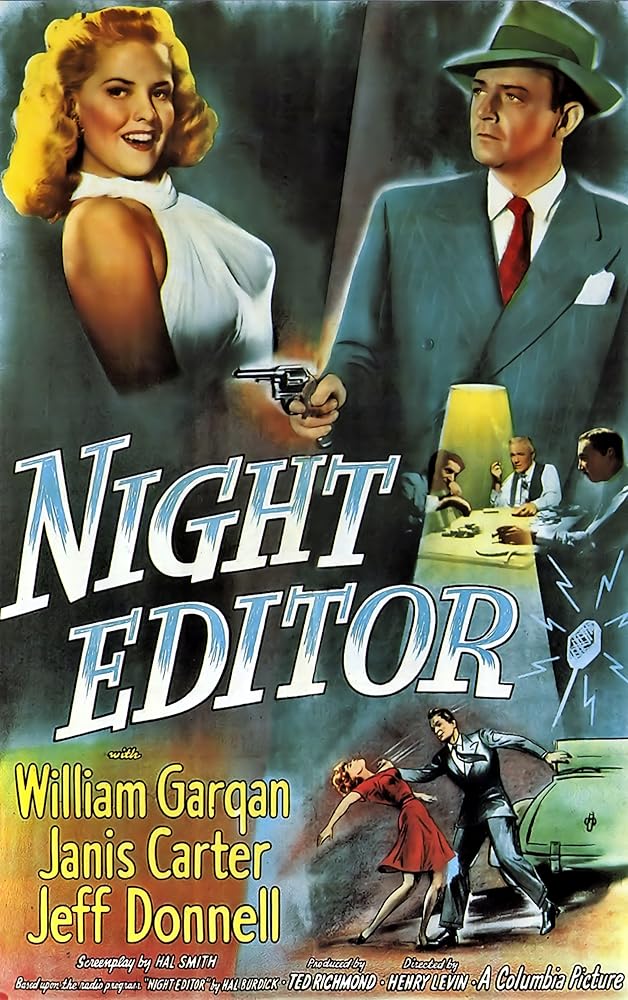
NIGHT EDITOR
(director: Henry Levin; screenwriter: Hal Smith/from the radio program “Night Editor” by Hal Burdick and the short story “Inside Story” by Scott Littleton; cinematographers: Philip Tannura/Burnett Guffey; editor: Richard Fantl; music: Mischa Bakaleinikoff; cast: William Gargan (Tony Cochrane), Janis Carter (Jill Merrill), Jeff Donnell (Martha Cochrane), Coulter Irwin (Johnny), Charles D. Brown (Crane Stewart), Paul E. Burns (Ole Strom), Harry Shannon (Captain Lawrence), Frank Wilcox (Douglas Loring), Robert Stevens (‘Doc’ Cochrane), Roy Gordon (Ben Merrill), Jack Davis (District Attorney Bill Halloran); Runtime: 65; Columbia; 1946)
“Inspired by the radio program of the same name.”
Reviewed by Dennis Schwartz
Warning: spoilers throughout.
“Night Editor” is inspired by the radio program of the same name. Its story is about a law officer gone wrong who is trying to redeem himself. He is introduced by a bunch of graveyard-shift reporters working the police beat. The night editor of the New York Star, Mr. Stewart (Charles D. Brown), while playing poker with the boys, tells in flashback a story about homicide detective Doc Cochrane’s father Tony (William Gargan). He tells it for the benefit of a young reporter who just straggled in late for work, Johnny (Irwin), who is on a drinking binge and looks terrible.
Homicide Lieutenant Tony Cochrane, who grew up on the wrong side of the tracks and had to fight for everything he got, is having an affair with the very attractive and wealthy socialite married woman Jill Merrill (Janis Carter). She’s a poison that got into his bloodstream and he can’t break the year long affair, even though he loves his wife Martha and his son Doc.
The lovers park at an isolated beach spot at night and witness a brutal killing. The killer batters his victim with repeated blows from a tire iron. When Tony pulls out his gun and has a clear shot at the fleeing killer, Jill urges him to let the killer go or else their lives will be ruined by scandal. The violence makes Jill even more sexually aroused, as she excitedly squirms and asks Tony to show her the battered body.
Tony sulks but remains silent, ashamed that he didn’t do his duty. He and his partner Ole Strum (Burns) are assigned to investigate the murder. Ole uncovers tire track marks of another car at the murder site. But the investigation suddenly closes when a handyman is found at the beach with the socialite victim’s jewelry. The innocent man receives a death sentence and the guilt-stricken Tony works on his own to get evidence connecting the crime to a socialite married banker that the victim was secretly having an affair with, Mr. Loring (Wilcox).
Tony puts together some circumstantial evidence, showing that Loring’s prints were on the car and pleads with D. A. Halloran to stay the execution. But Loring is present at the district attorney’s office, and confesses to having an affair with the victim. This he explains is the reason for the fingerprints. He further brings Jill in as his alibi, claiming they were at a movie together at the time of the murder. Jill takes comfort that even though Tony rejected her, she has now found her soulmate in Loring.
Tony can’t live with his guilt any longer and shows Ole the tire he owns is the one that was at the murder site, and he decides to give up his police career and serve jail time rather than let an innocent person go to the chair and a murderer get away with the crime. When he goes to arrest Jill at her home party, she resists and sticks him with an ice pick in his back as they were having one last kiss for the road.
Tony is now the cigarette vender in the newspaper building and his son is the hotshot homicide detective. The young drunken reporter sobers up and makes contact with the lobby cigarette vender with new respect, as he realizes that’s Tony Cochrane.
Janis Carter is the femme fatale. She’s corrupt, uncaring, and knows how to use sex to get what she wants. William Gargan is the noir protagonist who has everything he wants and is still not happy, until he falls and sees what he lost. This film is an example of sex and violence interacting to bring a weak man down. He can’t stop from being perverse, that is, until he is faced with a moral decision involving life or death. The film does a good job of showing how this could happen to a decent family man and a hardworking honest cop.
REVIEWED ON 3/29/2002 GRADE: B